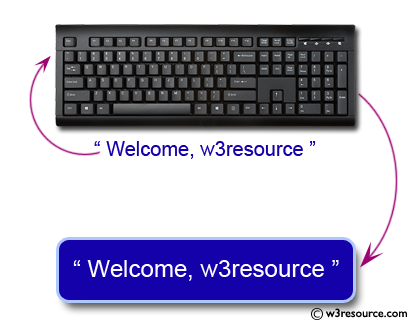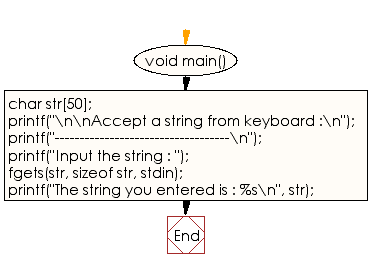C Programming: Accept a string from keyboard
C String: Exercise-1 with Solution
Write a program in C to input a string and print it.

Sample Solution:
C Code:
#include <stdio.h>
#include <stdlib.h>
void main()
{
char str[50];
printf("\n\nAccept a string from keyboard :\n");
printf("-----------------------------------\n");
printf("Input the string : ");
fgets(str, sizeof str, stdin);
printf("The string you entered is : %s\n", str);
}
Sample Output:
Accept a string from keyboard : ----------------------------------- Input the string : Welcome, w3resource The string you entered is : Welcome, w3resource
Flowchart:

C Programming Code Editor:
Improve this sample solution and post your code through Disqus.
Previous: C String Exercises Home
Next: Write a program in C to find the length of a string without using library function.
What is the difficulty level of this exercise?
Test your Programming skills with w3resource's quiz.
C Programming: Tips of the Day
Static variable inside of a function in C
The scope of variable is where the variable name can be seen. Here, x is visible only inside function foo().
The lifetime of a variable is the period over which it exists. If x were defined without the keyword static, the lifetime would be from the entry into foo() to the return from foo(); so it would be re-initialized to 5 on every call.
The keyword static acts to extend the lifetime of a variable to the lifetime of the programme; e.g. initialization occurs once and once only and then the variable retains its value - whatever it has come to be - over all future calls to foo().
Ref : https://bit.ly/3fOq7XP
- New Content published on w3resource:
- HTML-CSS Practical: Exercises, Practice, Solution
- Java Regular Expression: Exercises, Practice, Solution
- Scala Programming Exercises, Practice, Solution
- Python Itertools exercises
- Python Numpy exercises
- Python GeoPy Package exercises
- Python Pandas exercises
- Python nltk exercises
- Python BeautifulSoup exercises
- Form Template
- Composer - PHP Package Manager
- PHPUnit - PHP Testing
- Laravel - PHP Framework
- Angular - JavaScript Framework
- Vue - JavaScript Framework
- Jest - JavaScript Testing Framework
